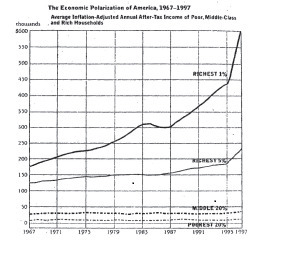Interestingly, participants tended to favor dispositional explanations over contextual explanations on average. That means our participants thought inequality was due to internal states, personal abilities, and individual actions (e.g., hard work, ability and talent) rather than external forces (e.g., inheritance, political influence, education opportunities). This result is not surprising, given that people in the USA tend to favor dispositional explanations more broadly--it's a product of our individualistic culture. What was interesting is that participants who came from families that they perceived to be wealthy and educated tended to favor these dispositional explanations more than their less wealthy/educated counterparts. Said another way, students from upper-class families tended to believe that economic inequality was a result of individual effort, ability, and talent, whereas their lower-class counterparts believed that the same inequality was due to external forces (e.g., political influence, educational opportunities).

 Your new post is loading...
Your new post is loading...
 Your new post is loading...
Your new post is loading...











